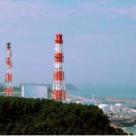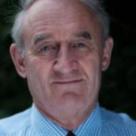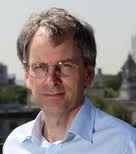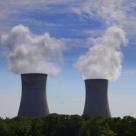This seminar series, organised by Dr Columba Peoples, brought together a range of speakers from different disciplinary backgrounds, and audiences comprised of academics, students, representatives of industry and members of the public, to reflect on the question What should the future for nuclear power be?
Debates about nuclear renewal and extension have been high on the political agenda in the UK (and beyond) for some time, and recent events and developments have introduced a new level of priority to discussions on the future of nuclear power – at local, national and global levels. Organised in conjunction with the University of Bristol-University of Oxford Nuclear Research Centre (NRC), this seminar series engaged a wide range of pertinent themes related to nuclear power, including hazards and risks, public perceptions of nuclear power, and the prospects of the ‘nuclear renaissance’ within and beyond the UK.

 Speaking in October 2011 in a seminar entitled ‘Natural Hazards and Nuclear Siting Issues’, Professor Willy Aspinall (Cabot Institute Professor in Natural Hazards and Risk Science, and Visiting Industrial Professor at the University of Bristol) reviewed the extent to which natural hazards are taken into account in the selection of sites for nuclear facilities and addressed the respective merits and limitations of different research methodologies for informing this process. Reflecting on implications for possible nuclear siting issues in the UK, the seminar encompassed detailed discussion of research findings on the events of the 2007 Niigataken-Chuetsu-oki earthquake off the west coast of Japan and its effects on the Kashiwazaki-Kariwa nuclear power-plant, a review of seismic and volcanic hazards in relation to several nuclear facilities globally, and the potential for learning lessons from the events at the Fukushima Dai-ichi nuclear power station in the great 2011 Tohoku-oki earthquake and tsunami.
Speaking in October 2011 in a seminar entitled ‘Natural Hazards and Nuclear Siting Issues’, Professor Willy Aspinall (Cabot Institute Professor in Natural Hazards and Risk Science, and Visiting Industrial Professor at the University of Bristol) reviewed the extent to which natural hazards are taken into account in the selection of sites for nuclear facilities and addressed the respective merits and limitations of different research methodologies for informing this process. Reflecting on implications for possible nuclear siting issues in the UK, the seminar encompassed detailed discussion of research findings on the events of the 2007 Niigataken-Chuetsu-oki earthquake off the west coast of Japan and its effects on the Kashiwazaki-Kariwa nuclear power-plant, a review of seismic and volcanic hazards in relation to several nuclear facilities globally, and the potential for learning lessons from the events at the Fukushima Dai-ichi nuclear power station in the great 2011 Tohoku-oki earthquake and tsunami.

 In his seminar on ‘Public Perceptions of Nuclear Power’ in February 2012, Professor Nick Pidgeon (School of Psychology, University of Cardiff) dealt with the subject of public trust in the UK’s nuclear sector. The seminar drew on interview and survey data from the past decade conducted with people living and working close to former and existing nuclear plants at Bradwell (Essex), Oldbury (Gloucestershire) and Hinkley Point (Somerset), as well as nationally representative UK survey data. Amongst the key findings covered, Professor Pidgeon in particular focused on what he termed as the ‘reluctant acceptance’ of nuclear power as part of the future UK energy mix. Nuclear power being reframed as part of the ‘policy solution to climate change’ and future ‘energy security’ was found to be generally accepted, but often with key reservations and a wide spectrum of responses on questions related to trust in nuclear technology and those who manage it, and in perceptions of risks associated with nuclear power more generally.
In his seminar on ‘Public Perceptions of Nuclear Power’ in February 2012, Professor Nick Pidgeon (School of Psychology, University of Cardiff) dealt with the subject of public trust in the UK’s nuclear sector. The seminar drew on interview and survey data from the past decade conducted with people living and working close to former and existing nuclear plants at Bradwell (Essex), Oldbury (Gloucestershire) and Hinkley Point (Somerset), as well as nationally representative UK survey data. Amongst the key findings covered, Professor Pidgeon in particular focused on what he termed as the ‘reluctant acceptance’ of nuclear power as part of the future UK energy mix. Nuclear power being reframed as part of the ‘policy solution to climate change’ and future ‘energy security’ was found to be generally accepted, but often with key reservations and a wide spectrum of responses on questions related to trust in nuclear technology and those who manage it, and in perceptions of risks associated with nuclear power more generally.

 Dr William Nuttall (Judge Business School, University of Cambridge), taking the stance of an engaged academic outsider to the UK policy-making process, reflected on technology and policy issues shaping and driving the UK ‘nuclear renaissance’, and it’s future prospects, in a seminar entitled ‘The UK Nuclear Renaissance: How is it going?’ in April 2012. As well as analysing the context of contemporary energy policy and nuclear research and technology policy in the UK pre- and post-Fukushima, the seminar concentrated on questions of financing and economic risks related to nuclear new build in the UK. Although nuclear research and technology policy in the UK was judged to be moving forward, Dr Nuttall argued the view that the nuclear renaissance is still ‘fragile’ in a context of strengthening, but still weak, technology push factors and weakening market pull factors. He consequently suggested that if the nuclear renaissance is to continue into the future in the UK, a greater degree of government intervention and political engagement with these issues would be required.
Dr William Nuttall (Judge Business School, University of Cambridge), taking the stance of an engaged academic outsider to the UK policy-making process, reflected on technology and policy issues shaping and driving the UK ‘nuclear renaissance’, and it’s future prospects, in a seminar entitled ‘The UK Nuclear Renaissance: How is it going?’ in April 2012. As well as analysing the context of contemporary energy policy and nuclear research and technology policy in the UK pre- and post-Fukushima, the seminar concentrated on questions of financing and economic risks related to nuclear new build in the UK. Although nuclear research and technology policy in the UK was judged to be moving forward, Dr Nuttall argued the view that the nuclear renaissance is still ‘fragile’ in a context of strengthening, but still weak, technology push factors and weakening market pull factors. He consequently suggested that if the nuclear renaissance is to continue into the future in the UK, a greater degree of government intervention and political engagement with these issues would be required.
Continuing on the theme of ‘Nuclear Futures’ as addressed by the seminar series, Dr Peoples has subsequently been awarded a University of Bristol Research Fellowship by the Institute for Advanced Studies, to conduct a follow-on research project on Nuclear Security: Science, Technology and Sustainability in 2012-2013. Analysing current debates on energy security, sustainability and resilience, the project will investigate competing understandings of ‘nuclear security’, how it is defined and understood, and whether and how it can be achieved.